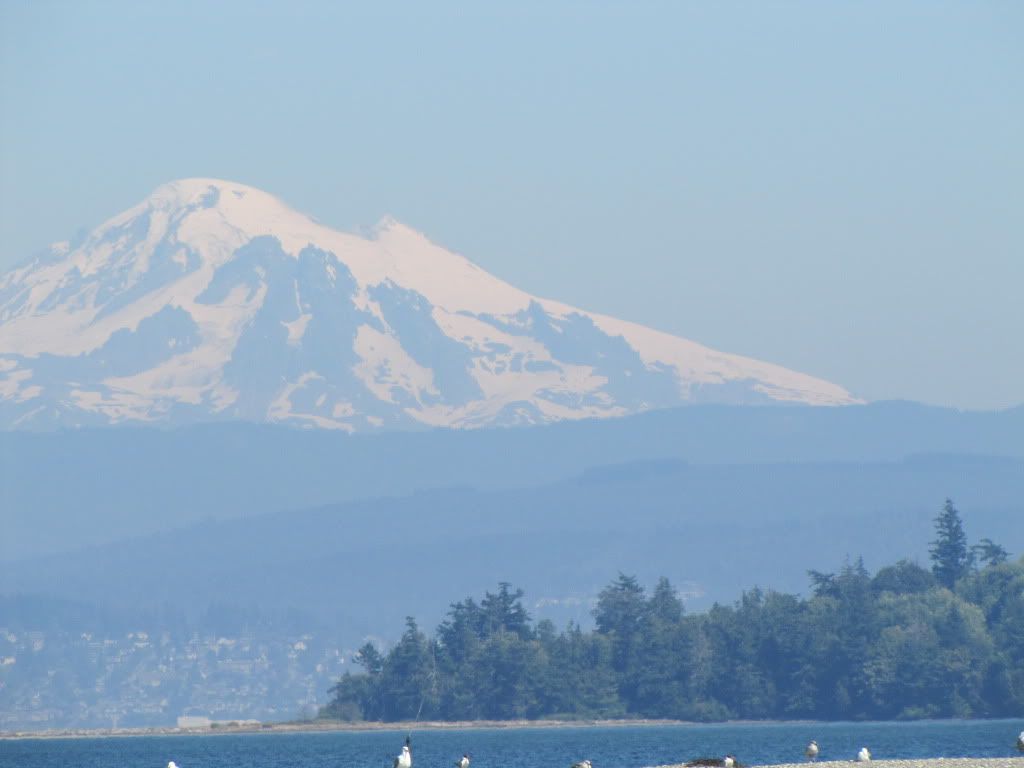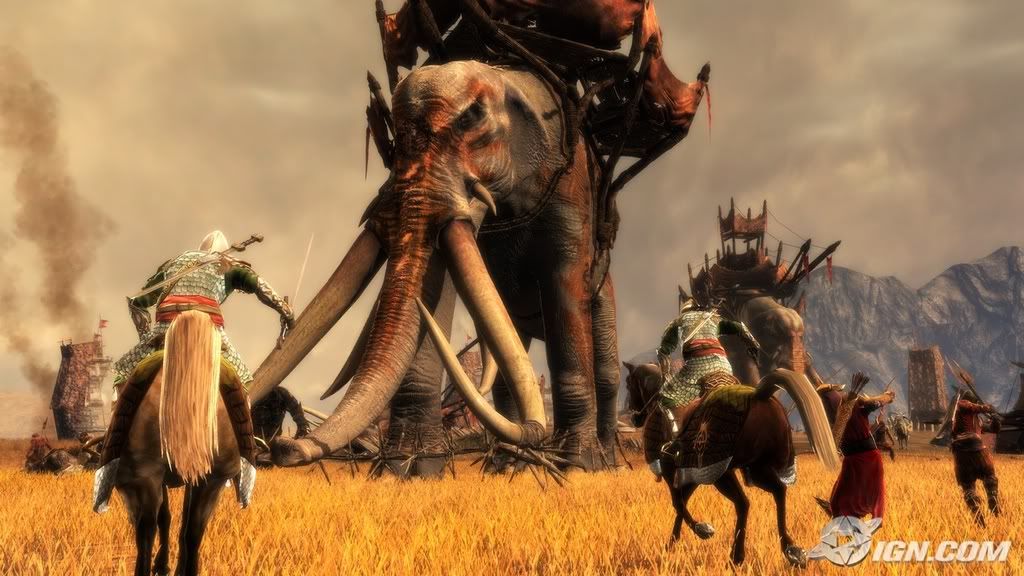Conventional wisdom says no. Their elephant feet will simply stomp you. Armed with lawyers, guns, and money, they will have their way.
But maybe it is possible to be fast enough, nimble enough, and most of all, persuasive enough, that the Mumakil will be bewildered and will run off. Maybe CW does not cover all possibilities.
Hopefully, the destructive coal export plans planned for the northwest US will gain the national attention from the environmental community, on par with that given to Keystone XL, that they deserve. Until those reinforcements arrive, it is up to those of us who live in the targeted communities to defend our fair citadels in any way we can.
It appears that our federal government is not going to do much of anything to mobilize our country to reduce our contribution to global warming and other fossil fuel devastation. It will be up to each of us, from an individual level up through our communities and sometimes states, to get the job done. Then perhaps the "leaders" will follow. Step 1: Stop large new carbon projects.

Our fair citadel
While Keystone XL gets all the press (perhaps because it makes for good R vs D melodrama), the vast new proposals to export coal to China will actually have as large or larger climate impact, as well as many other harms. A set of the key facts on the climate impacts of coal export is assembled here in
Lefty Coaster's recent diary.
The largest and most tangibly advanced coal export scheme is at Cherry Point, WA. In what is Pretty Much the Dumbest Idea Ever, they plan to ship trillions of pounds of rocks to China to be lit on fire so they can make more things to sell to us so we are even deeper in debt.
Despite diligent efforts by the terminal project planners to bully and fool us into participating in our own destruction, this proposal has galvanized opposition, starting locally in the vicinity of the nearest sizeable town of Bellingham WA, and now spreading along the entire transit route.

Fear the elephant feet!
In just one of the several local opposition efforts, a group of Bellinghamsters called
Coal Free Bellingham are organizing an initiative which would ban the transport of coal through the city. No coal trains through Bellingham, no coal export terminal. That's it.
But, but, you can't do that! How can mere people stand up to railroads? After all, they have feet like elephants! Turns out that's what the Mumakil riders want us to believe:
Craig Cole, an SSA Marine spokesman, had little to say about the No Coal! ordinance plan. In an email, he indicated that railroad operations are beyond the scope of city authority.
"Such matters are governed by federal and state constitutions and laws," Cole said.

The ancient magical scrolls of power
For Coal Free Bellingham, that gets right to the heart of the matter. Court cases over many years have interpreted the Constitution in a manner to give corporations more and more ability to trump local decision makers. That has given us monstrosities like Citizens United,
just the latest corrosive ruling. These corporate rights are nowhere in the actual constitution and, it is increasingly clear, were simply written into legal precedent to benefit the powerful.
.
The writers of the Bellingham initiative worked with, and drew extensively on work done by Community Environmental Legal Defense Fund (CELDF). This group has worked with other localities to ban harmful practices such as shale gas fracking. Here is the startling fact that the mumakil riders don't want you to know:
Over 95% of those local bans are still standing.
That's right. Similar ordinances, such as the Pittsburgh, PA ban on fracking are in effect and preventing harm right now.
If there is no legal basis for a locality to stop the activities of "interstate commerce", how could this be?
There are several layers of answers, and they all matter:
1) There are real legal questions about the invincibility of corporations and their Interstate Commerce shield.

They continue many years past
the flesh that gave them life
In short, just because an activity constitutes "interstate commerce" doesn't mean it can't be regulated at a more local level. There are many, many examples of state laws and local ordinances that are in powerful effect, no matter how state-crossing your activity. A better way to look at the relationship between federal, state, and local is to say that each level can add protections, but not strip them away.
Corporations rely on the many federal laws that contain so-called "pre-emption." The federal law asserts that a state or local law is not allowed to contradict the federal law with respect to certain things. It can be tougher nut to crack, but lets be clear that the pre-emption in the federal law is an assertion, it's a power that they are saying they want to have. You say we can't have a local ordinance. We say we can. Nyah Nyah. It's an open legal matter, not a certainty.
2) The bright light of reality

Courage can defeat those believed to be invincible
They want you to be very afraid of their elephant feet, but corporations don't actually want the footage of screaming people being squashed under those feet.
If a locality passes, by popular vote, a prohibition on a harmful activity, and the corporations prevail due to courtroom muscle, it's pretty easy to see those elephant feet coming down.
This may be one of the big reasons why so few of the recently passed local prohibitions in the east have even been legally challenged. By definition, it would be an attempt to stomp on the express, democratically voted will of a population.
3) Ultimately, there are political decisions that are going to get made
The coal mongers would like nothing better than an apparently technocratic, procedural path to line up their permits and get them signed. That's because the permitting process is generally designed to extract some modifications, or mitigations, to expected harm from proposed projects, not to stop those projects. The Whatcom County permitting head Tyler Schroeder said as much in a recent public meeting (this is my interpretation of what he said in response to the question "Can this be stopped?"; I am not aware of a transcript).
So, while politics is often deservedly a dirty word, it's actually good thing here that there are a few check points where elected officials will be expected to look at the larger picture and examine, not whether the applicant lined up all of their pieces of paper correctly, but whether the project is actually a good idea (hint: it's not). For instance, it appears that the Whatcom County commissioners will at some point need to take a vote on whether to approve the project.
In that case, if there is at that time a city prohibition, passed by majority vote (and hopefully a county-wide one as well, in a parallel effort), this will be a telling signal to those elected officials, whether at a county level or to our newly elected WA governor in 2013 (Go Jay!).
I like their ambition. I like their chances. Okay, I like anything that gets in the way of this scheme. But the positive and really engaging aspect of the Coal Free Bellingham initiative is the way that it brings direct democracy into the picture. It's not about battling in the maze of the several permitting paths (don't worry, we'll do that too). It's not technocratic details. It's just this - let's act as if we have rights and put it up to a vote, as Americans, and assert, as Coal Free Bellingham says - "Our Right to Decide."
Speaking of elephants, don't miss KC Golden's brilliant column Why did the elephant wear a green felt hat? Just another aspect of the elephant - they want you to fear their elephant feet, yet not see the mammoth size of the impacts they will bring upon us.
Any time you think that you don't have a choice, you actually do.
Any time you think you have to do something that's wrong, you don't.

Our future - worth saving
Not in Our community.
Not in any other place.
Not Today.
Not Tomorrow.
Not Next Year.
We shall not participate in our own Destruction.
LotR images credit: New Line Cinema and IGN.com


